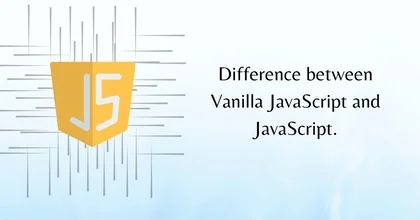Difference between Vanilla JavaScript and JavaScript.
In this article we will explore what is JavaScript & distinguish between Vanilla JavaScript and JavaScript
JavaScript is a versatile programming language used in web development. It allows you to create interactive elements on web pages. Learning JavaScript is beginner-friendly, and resources like the W3Schools tutorial cover everything from basics to advanced concepts.
Difference between Vanilla JavaScript and JavaScript.
Vanilla JavaScript
Definition: Vanilla JavaScript, also known as “pure JavaScript,” refers to the **raw, unmodified* form of the JavaScript language.
Features
- It is the core JavaScript language without any additional libraries or frameworks.
- You write code directly using the built-in JavaScript functions and syntax.
- It’s suitable for *basic projects* where features are limited or development time needs to be short.
Example: If you write code using only the basic JavaScript language (without any external libraries), you’re working with Vanilla JavaScript.
JavaScript
Definition: JavaScript (often abbreviated as JS) is a **programming language* commonly used to create interactive effects within web browsers.
Usage
- It can be used to build both the *front end* and *back end* of a website.
- JavaScript code can be inserted anywhere within the HTML of a webpage.
- It has several *frameworks* and *libraries*, such as React, Angular, Vue.js, and jQuery.
Frameworks and Libraries
When you use frameworks or libraries like React, Angular, or jQuery, you’re working with non-vanilla JavaScript.
These frameworks provide additional features and simplify certain tasks.
Comparison:
- Vanilla JavaScript is like the *original form* of ice cream (plain, simple, and undiluted).
- Non-vanilla JavaScript (with frameworks) is like ice cream with added flavours and colours.
Read Also: CRUD operations using Vue.js
Pros and Cons
- Using non-vanilla JavaScript provides more functionality but comes with its own set of advantages and disadvantages.
- Remember, Vanilla JavaScript is the foundation, and non-vanilla JavaScript builds upon it. Choose the approach that best suits your project’s requirements!
- Choose the approach that best suits your project’s requirements!

